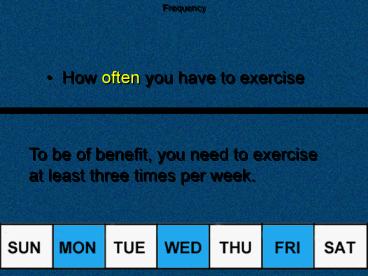Naval Science I_CadetFieldManual_Unit6 - PowerPoint PPT Presentation
1 / 42
Title: Naval Science I_CadetFieldManual_Unit6
1
Frequency
How often you have to exercise
To be of benefit, you need to exercise at least
three times per week.
2
Duration
How long a work out should last to be
effective
Should last at least 15 to 30 minutes to
benefit your fitness
3
Cardiovascular Fitness
Fitness of the heart, lungs, blood, and
blood vessels Determined by your
aerobic heart rate
4
Aerobic Heart Rate
Resting Heart Rate
Aerobic Heart Rate
Beginner Regular
135-140 145-150 140-145 150-155 145-150
155-160
Less than 50 beats/min 51 - 70 beats/min 71 and
above beats/min
5
Determining Frequency Fitness Target Zone
At least three times a week
The best results may be gained from three to six
times per week.
6
Determining Duration
A minimum of 15 minutes to raise your
heart rate
Longer periods recommended
7
Warm-up
A brief period of light exercise to prepare
you for more vigorous exercise
8
Cool-down
A short period after your workout during
which the body attempts to get "back to
normal" Should normally last at least 5
minutes
9
Heat Stress and Dehydration
To limit the effects of heat stress
and dehydration, you must replace the water that
is lost by the natural sweating that occurs under
normal nonphysical activities.
10
Heat Stress and Dehydration
This is particularly true for those who are
unacclimated, have Sickle Cell Trait, are
fair-skinned, or have blond or red hair.
11
Heat Stress and Dehydration
Another preventative measure to heat stress is to
eat foods rich in potassium to maintain the
correct electrolyte balance.
Bananas Potatoes Greens
12
Heat Stress and Dehydration
Whole grains and bread are also important in
preventing heat stress.
13
Three Basic Heat Casualties
Heat Cramps Heat Exhaustion Heat Stroke
14
Heat Cramps
Heat cramps are precipitated by replacement
of body water losses without concurrent replacemen
t of body salt. Most frequently involved are
the muscles of the arms, legs, or abdomen.
15
Heat Exhaustion
Heat exhaustion is caused by strenuous exertion
and exposure to high temperatures and
humidities. It is usually the result
of excessive salt depletion and dehydration.
16
Symptoms of Heat Exhaustion
Profuse sweating Shortness of breath
Feeling ill Headaches Weakness Blurred
vision Nausea Muscle cramps
17
Heat Stroke
This is a medical emergency!
It develops from heat exhaustion compounded by
the body's decreased sweat rate. DO NOT attempt
to make the person drink while waiting for
emergency medical personnel to arrive.
18
During periods of moderate physical activity,
with moderate temperatures and humidity, you
should consume adequate amounts of water at 20-30
minute intervals.
19
As physical activities or temperatures and
humidity conditions become more severe, the
intake should be increased accordingly.
20
"Fill up" 30 minutes prior to strenuous physical
activities. To help prevent dehydration,
you should consume 10 ounces of cool water 10
minutes before participating in the 1.5-mile run,
and an additional 8 ounces of cool water
after completing the run.
21
Q.1. What percent of adult Americans do any
kind of regular exercise?
22
Q.1. What percent of adult Americans do any
kind of regular exercise?
A.1. About 55 of adult Americans do any
kind of regular exercise.
23
Q.2. TRUE or FALSE. It is a proven fact that
fitness declines with age.
24
Q.2. TRUE or FALSE. It is a proven fact that
fitness declines with age.
A.2. TRUE.
25
Q.3. What do we mean by the term mental
fitness?
26
Q.3. What do we mean by the term mental
fitness?
A.3. Mental fitness means that the
individual has a healthy outlook on life.
27
Q.4. What do we mean by the term
emotional fitness?
28
Q.4. What do we mean by the term
emotional fitness?
A.4. Emotional fitness is the ability to
be stable, self-controlled, and the
ability to face reality in an honest
manner and having ethical standards.
29
Q.5. What do we mean by physical fitness?
30
Q.5. What do we mean by physical fitness?
A.5. The ability of your whole body,
including the muscles, skeleton, heart
and all the other parts to work together
efficiently
31
Q.6. What do we mean by the term speed?
32
Q.6. What do we mean by the term speed?
A.6. Speed is the ability to perform a
movement or cover a distance in a short
period of time.
33
Q.7. What do we mean by the term
coordination?
34
Q.7. What do we mean by the term
coordination?
A.7. Coordination is the ability to use
your senses, such as your eyes, together
with other body parts or to use two or
more parts of the body together.
35
Q.8. TRUE or FALSE. Intensity deals with
how hard you have to work for the
exercise to be effective.
36
Q.8. TRUE or FALSE. Intensity deals with
how hard you have to work for the
exercise to be effective.
A.8. TRUE.
37
Q.9. What does the term aerobic mean?
38
Q.9. What does the term aerobic mean?
A.9. Aerobic means with oxygen.
39
Q.10. What does the term warm-up mean?
40
Q.10. What does the term warm-up mean?
A.10. Warm-up is a brief period of
light exercise to prepare you for more
vigorous exercise.
41
Q.11. Why is the cool-down period
extremely important after a workout?
42
Q.11. Why is the cool-down period
extremely important after a workout?
A.11. It gives the circulatory system
and your breathing a chance to return
to almost normal.































